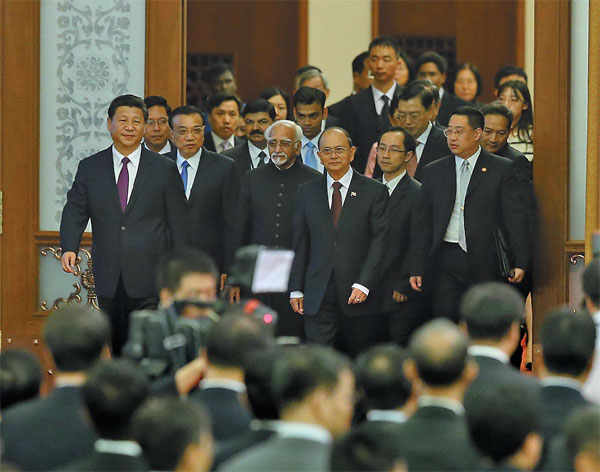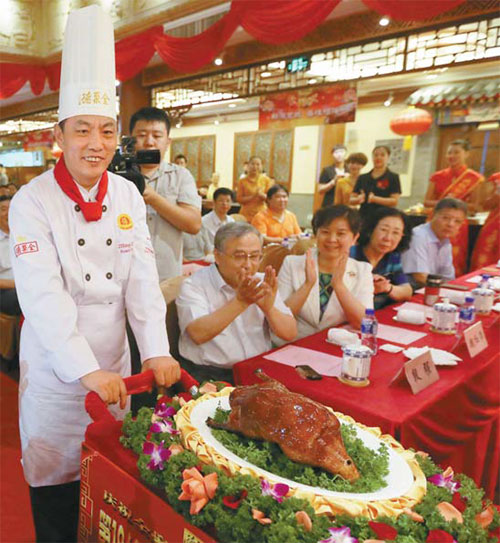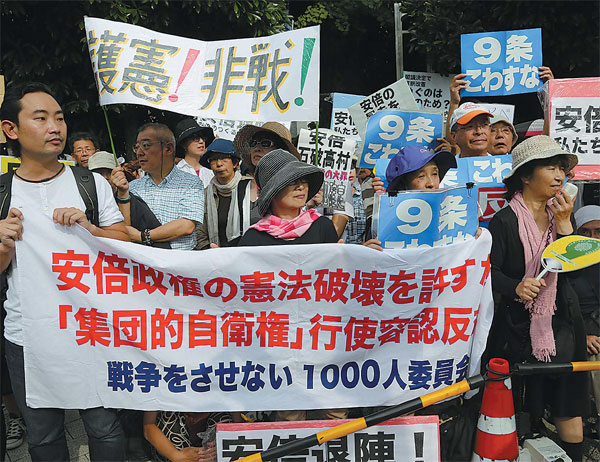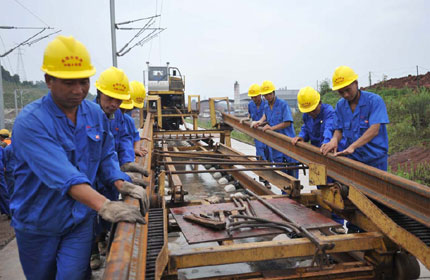What's news
Updated: 2014-07-04 08:08
(China Daily Europe)
|
|||||||||||
|
Chinese President Xi Jinping, Premier Li Keqiang, India's Vice-President Mohammad Hamid Ansari and Myanmar's President U Thein Sein (front row from left to right) attend a joint commemoration held at the Great Hall of the People on June 28 to mark the 60th anniversary of the Five Principles of Peaceful Coexistence. Xu Jingxing / China Daily |
|
Zheng Zhiqiang, head chef at the Qianmen branch of Quanjude, an eatery famous for its roast-duck dish dating to 1864, presents its 196 millionth duck to a customer in celebration of its 150th anniversary in Beijing on July 2. Cai Hong / China Daily |
Xi pledges China will never seek hegemony
China will never seek hegemony, no matter how strong it becomes, President Xi Jinping said in Beijing on June 28 at a meeting to mark the 60th anniversary of the Five Principles of Peaceful Coexistence.
"China does not accept the logic that a strong country is bound to become hegemonic, and neither hegemony nor militarism is in the Chinese DNA," Xi said in a speech, as he played host to leaders from Myanmar and India to commemorate the anniversary.
Citing poems and old sayings from the three countries, Xi called for dialogue based on equality to resolve disputes and joint efforts to preserve regional peace.
He also announced the establishment of a friendship award and an outstanding scholarship related to the Five Principles of Peaceful Coexistence.
Observers said Xi's remarks and the first meeting of leaders of all three of the peace code's founding countries since its inception sought to assure the world of China's peaceful development amid simmering tension in the East and South China seas.
Software moves to pressure foreign firms
The government's rising fears over information safety may further cut the market share for overseas software enterprises in government procurement, a major profit source for global giants including Microsoft, Adobe and Oracle, analysts said on June 30.
Their remarks followed a China Securities Journal report that China is ruling out Microsoft's Office software suite from some state-level government agencies, citing unnamed sources.
The US company quickly rejected the report as "completely untrue".
"We have contacted the Ministry of Finance, the governing body of government procurement projects. They had no idea of the ruling as well," a senior Microsoft executive said on condition of anonymity.
But overseas software products will feel increasing pressure in getting government orders as local players are set to win over market share in the long run, industry insiders warned.
"The incident shows increasing concerns about information security by the Chinese government, from both infrastructure and application perspectives, especially considering the increasing terror attacks in the country," said Charlie Dai, principal consulting analyst at Forrester Research.
Forbidden City feels squeeze of visitors
The Palace Museum in Beijing is looking for new ways to accommodate the overwhelming number of visitors who pour through its doors every year.
Proposals being considered include half-price tickets after 2 pm.
"We would like to encourage visitors to avoid the peak time in the morning and switch to the afternoon, so they can have more comfortable touring experiences," said the museum's director, Shan Jixiang.
The Palace Museum will try out the new pricing from Sept 14 to 16.
Annual tickets are also in the works, which would allow visitors to enter the museum 10 times a year. Chinese students and seniors are eligible for half-price discounts.
"That will benefit those who love ancient palace construction or the abundant collections and need to visit multiple times," Shan said.
The museum received 15.3 million visitors in 2012, with about 182,000 on its busiest day. It averages 70,000 visitors a day during summer and 20,000 in winter.
Barrier posts secure pedestrian safety
Beijing has been upgrading safety features on Chang'an Avenue and at crossings along the road over the past few months to prevent vehicles from crashing into pedestrians.
Hundreds of crash barrier posts have been installed along the avenue, which runs through the capital's major streets and key scenic spots, including the Wangfujing shopping area and Tian'anmen Square.
Each steel-reinforced concrete post is 60 centimeters tall and covered with stainless steel, according to a traffic warden who works at a crossing at Fuxingmen Waidajie.
Dai Peng, director of the investigation department at the People's Public Security University of China, said the improvement of safety facilities is a must for cities worldwide and it also is just the first step of comprehensive anti-terrorism measures in Beijing.
CPC growth slows due to stricter vetting
The Communist Party of China, the world's largest political party, had slower membership growth last year as it began to enlist new members in a more "prudent" and "balanced" manner.
The Party had 86.69 million members at the end of last year, up 1.8 percent year-on-year, the Organization Department of the CPC Central Committee said.
The growth rate was 1.3 percentage points lower than the previous year, the department said on June 30, the day before the 93rd anniversary of the founding of the Party.
Last year, 2.41 million people joined the Party, 825,000 fewer than in 2012. The net increase was 1.56 million. It represented the first annual drop in newly enlisted members in the past decade.
The Party enlisted 2.42 million new members in 2004, and new members continued to swell in the following years to 3.23 million in 2012.
Japanese cabinet lifts limits on self-defense
Thousands of demonstrators from all over Japan loudly protested outside Prime Minister Shinzo Abe's official residence on July 1 after he announced his cabinet's decision to lift the decades-long ban on collective self-defense.
The cabinet announced it will reinterpret Article 9 of the Japanese Constitution to allow for collective self-defense, or coming to the aid of an ally under attack. The article bans the use of military force to settle international disputes and prohibits Tokyo from sending troops overseas to fight.
On July 1, Beijing protested against Tokyo's strategy of pushing a domestic political agenda through its talk of a "China threat".
The Japanese cabinet has taken unprecedented measures in military and security fields, which has prompted "a major change in Japan's defense policies", Foreign Ministry spokesman Hong Lei said. "People cannot help but question whether Japan will change its path of peaceful development, which has been upheld since the war," Hong said.
Evacuated Chinese return from Iraq
The first group of Chinese workers evacuated from war-plagued Iraq spoke to their families by phone after landing in Guangzhou on June 29.
They said they were happy to be rid of the threat from flying bullets and bombs.
Public attention had focused on the safety of Chinese nationals since more than 1,200 Chinese working on power plant construction projects became trapped in the northern Iraqi city of Samarra.
The Chinese Foreign Ministry confirmed on June 27 that all 1,200 from China Machinery Engineering Corp had been evacuated to Baghdad.
HK youth urged to protect rule of law
Vice-President Li Yuanchao called on youth in Hong Kong to safeguard the rule of law and support the Hong Kong government to proceed with electoral reform in accordance with the Basic Law.
His call comes after a controversial poll and amid celebrations and protests on the anniversary of Hong Kong's return to China.
Li told about 2,000 Hong Kong youths at the Great Hall of the People in Beijing on July 1 that the Basic Law is the most important constitutional guarantee of the "one country, two systems" policy and Hong Kong's stability and prosperity.
Li said he hopes Hong Kong's young people can reinforce their awareness of the rule of law in order to safeguard the city's stability and support the local government reform of the 2017 chief executive election within the framework of the Basic Law and relevant decisions by the National People's Congress Standing Committee in a gradual and orderly manner.
On July 1, the Hong Kong government and residents held more than 200 activities to mark the return of the special administrative region to China 17 years ago, including flag-raisings and visits to the garrison of the Chinese army. Organizers estimated that 450,000 attended these activities.
Quake damage blamed for panda's death
It will be at least 10 more years before vegetation is restored in the mountains of the Wolong National Nature Reserve, China's largest panda reserve, so that the terrain, weakened by the 2008 Wenchuan earthquake, will be more stable, a panda expert says.
Zhang Hemin, chief of the reserve's administrative bureau, made the remarks after an adult panda was found dead near the sluice gate of the Gengda Hydropower Station in Wolong, Sichuan province, on June 27.
Zhang said damage from the Wenchuan catastrophe was to blame for the panda's death.
Panda experts from the China Conservation and Research Center for the Giant Panda in Wolong who went to the scene said they believed the panda had been washed down from the mountains to the sluice gate by flash floods.
Myanmar leader hails China ties
China and Myanmar pledged on June 27 to consolidate friendly ties as Myanmar's president arrived in Beijing to commemorate the initiation of a historic set of principles in the 1950s to handle international relations.
Observers said the trip by U Thein Sein reflects Myanmar's determination to see stronger ties with Beijing.
"Myanmar appreciates China's support and assistance that has lasted for a long time and will continue to support China in its core interests and major concerns," Thein Sein told President Xi Jinping when they met at the Great Hall of the People.
Thein Sein also said Chinese enterprises are welcome to invest in Myanmar. Reports have said Chinese investment is not as welcome in Myanmar as previously, while some major projects have been interrupted. Chinese investment in the country dropped sharply last year.
Taiwan's choices respected, says official
Mainland authorities are respectful of the Taiwan people's choice of social system and lifestyle, the mainland's chief official on Taiwan affairs said.
The mainland and Taiwan have evolved with different social systems, values, thoughts and lifestyles after decades of development, and mainland authorities respect those differences, said Zhang Zhijun, director of the State Council Taiwan Affairs Office.
Zhang made the remarks during a meeting with Kaohsiung Mayor Chen Chu in Taiwan on June 27.
"We welcome people from all walks of life in Taiwan, no matter what their regions, parties or religions are, to jointly promote the peaceful development of cross-Straits ties," he said.
Amusement parks multiply in China
International and domestic companies are rushing to invest in China's amusement parks, but analysts have warned of fierce competition and low profits.
Six Flags theme parks, a US company, and Riverside Investment Group, a real estate developer in China, have formed a partnership to build a number of Six Flags-branded theme parks in China over the next decade. Terms were not disclosed.
Texas-based Six Flags Entertainment Corp, with $1.1 billion in revenue, has 18 parks across the United States, Mexico and Canada.
In 2012 and 2013, a dozen theme parks and a water park were opened in China, with an estimated investment of 21.3 billion yuan ($3.44 billion), according to the China Theme Park Pipeline Report, released by management services company AECOM.
Another 59 theme parks are in the pipeline.
Top court considers launch of green tribunal
The Supreme People's Court is considering setting up an environment and resources tribunal to hear complex environmental disputes and solve increasingly severe pollution problems, says insiders.
Experts have confirmed the move, but the court declined to comment on the issue on June 27. An official announcement was expected.
Wang Canfa, an environmental law professor at China University of Political Science and Law, said environmental dispute cases are unique. It can be hard to identify those responsible, damage may have been caused over a long period and both the environment and local residents may be affected, Wang said.
Setting up a government body specializing in such cases can promote the role of the judges and ensure that cases are resolved fairly, he said. Unlike environment and resources tribunals at local levels, legal experts expect the top court's tribunal to take on a variety of functions, such as providing guidelines to local tribunals and hearing individual environmental cases.
China Daily
|
Protesters gather outside the Japanese embassy in Seoul on July 1 to voice their opposition to the Japanese government's plan to ease controls on its military. Cai Hong / China Daily |
(China Daily European Weekly 07/04/2014 page2)
Today's Top News
Gambling costs World Cup fans their lives
US supports Ukraine's decision to suspend ceasefire
It's all about making a spectacle
China likely to see 7.5% growth in second quarter
Palace Museum feeling the squeeze of visitors
Myanmar pagoda replica given to China
US sends 300 more troops to Iraq over concerns
Hong Kong at the crossroads
Hot Topics
Lunar probe , China growth forecasts, Emission rules get tougher, China seen through 'colored lens', International board,
Editor's Picks

|

|

|

|

|

|








